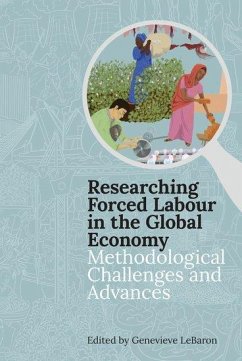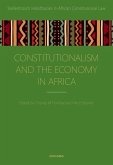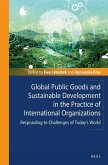Researching Forced Labour in the Global Economy
Methodological Challenges and Advances
Herausgeber: Lebaron, Genevieve
Schade – dieser Artikel ist leider ausverkauft. Sobald wir wissen, ob und wann der Artikel wieder verfügbar ist, informieren wir Sie an dieser Stelle.
Researching Forced Labour in the Global Economy
Methodological Challenges and Advances
Herausgeber: Lebaron, Genevieve
- Gebundenes Buch
- Merkliste
- Auf die Merkliste
- Bewerten Bewerten
- Teilen
- Produkt teilen
- Produkterinnerung
- Produkterinnerung
Researching Forced Labour in the Global Economy provides an overview of research methods that academics and researchers can use to investigate forced labour, human trafficking, and slavery in the global economy. It seeks to aid our understanding of exploited labour and explore the mechanisms through which businesses profit from it.
Andere Kunden interessierten sich auch für
![Constitutionalism and the Economy in Africa Constitutionalism and the Economy in Africa]() Constitutionalism and the Economy in Africa245,99 €
Constitutionalism and the Economy in Africa245,99 €![The Oxford Handbook of International Law and Development The Oxford Handbook of International Law and Development]() Ruth BuchananThe Oxford Handbook of International Law and Development210,99 €
Ruth BuchananThe Oxford Handbook of International Law and Development210,99 €![Environmental Regulation and Economic Growth Environmental Regulation and Economic Growth]() Norton Rose M5 GroupEnvironmental Regulation and Economic Growth183,99 €
Norton Rose M5 GroupEnvironmental Regulation and Economic Growth183,99 €![Global Public Goods and Sustainable Development in the Practice of International Organizations Global Public Goods and Sustainable Development in the Practice of International Organizations]() Global Public Goods and Sustainable Development in the Practice of International Organizations223,99 €
Global Public Goods and Sustainable Development in the Practice of International Organizations223,99 €![Who Is the Enemy: Anthony Comstock Or You? Who Is the Enemy: Anthony Comstock Or You?]() Edwin C. WalkerWho Is the Enemy: Anthony Comstock Or You?33,99 €
Edwin C. WalkerWho Is the Enemy: Anthony Comstock Or You?33,99 €![Irish Emigration to the United States: What it has Been, and What it is. Facts and Reflections Espec Irish Emigration to the United States: What it has Been, and What it is. Facts and Reflections Espec]() Stephen ByrneIrish Emigration to the United States: What it has Been, and What it is. Facts and Reflections Espec35,99 €
Stephen ByrneIrish Emigration to the United States: What it has Been, and What it is. Facts and Reflections Espec35,99 €![Distinguishing the Righteous from the Roguish Distinguishing the Righteous from the Roguish]() J W LooneyDistinguishing the Righteous from the Roguish66,99 €
J W LooneyDistinguishing the Righteous from the Roguish66,99 €-
Researching Forced Labour in the Global Economy provides an overview of research methods that academics and researchers can use to investigate forced labour, human trafficking, and slavery in the global economy. It seeks to aid our understanding of exploited labour and explore the mechanisms through which businesses profit from it.
Produktdetails
- Produktdetails
- Verlag: Hurst & Co.
- Seitenzahl: 228
- Erscheinungstermin: 21. Februar 2019
- Englisch
- Abmessung: 231mm x 155mm x 25mm
- Gewicht: 544g
- ISBN-13: 9780197266472
- ISBN-10: 0197266479
- Artikelnr.: 54796964
- Herstellerkennzeichnung
- Libri GmbH
- Europaallee 1
- 36244 Bad Hersfeld
- gpsr@libri.de
- Verlag: Hurst & Co.
- Seitenzahl: 228
- Erscheinungstermin: 21. Februar 2019
- Englisch
- Abmessung: 231mm x 155mm x 25mm
- Gewicht: 544g
- ISBN-13: 9780197266472
- ISBN-10: 0197266479
- Artikelnr.: 54796964
- Herstellerkennzeichnung
- Libri GmbH
- Europaallee 1
- 36244 Bad Hersfeld
- gpsr@libri.de
Genevieve LeBaron is Professor of Politics and Co-Director of Sheffield Political Economy Research Institute (SPERI) at the University of Sheffield. She is also Co-Chair of the Yale University Modern Slavery Working Group. She has been awarded the British Academy 'Rising Star Engagement Award' for her work on forced labour by the British Academy for the Humanities and Social Sciences and was included in the global 'Top 100 Human Trafficking and Slavery Influence Leaders List'. Her research focuses on the business dynamics of forced labour in global supply chains, as well as the effectiveness of private governance systems to combat it.
* Notes on contributors
* Acknowledgements
* 1: Genevieve LeBaron: Introduction
* Part I: Surveying the Gaps
* 2: Andrew Crane and Genevieve LeBaron: Methodological Challenges in
the Business of Forced Labour
* 3: Nicola Phillips: The Politics of Numbers: Beyond Methodological
Challenges in Research on Forced Labour
* 4: Joel Quirk: The Politics of Forced Labour Research: NGOs,
Activists, and States
* 5: Jean Allain: What Is Forced Labour? A Practical Guide for
Humanities and Social Science Research
* 6: Sam Okyere: Confronting Bias in Ngo Research on Modern Slavery
* Part II: Frontiers of Forced Labour Research and Methods
* 7: Neil Howard: Why (and How) We Need To Talk To 'The Victims'
* 8: Jenny Chan: Researching Unfree Student Labour in Apple's Supply
Chain
* 9: Andreas Rühmkorf: Transparent Companies? Legal Research Strategies
to Understand Forced Labour in Global Supply Chains
* 10: Robert Caruana: The Role of Discourse Analysis in Researching
Severe Labour Exploitation
* 11: Jessica Pliley: Archival Trouble: Researching Sex Trafficking In
Early Twentieth-Century America
* Acknowledgements
* 1: Genevieve LeBaron: Introduction
* Part I: Surveying the Gaps
* 2: Andrew Crane and Genevieve LeBaron: Methodological Challenges in
the Business of Forced Labour
* 3: Nicola Phillips: The Politics of Numbers: Beyond Methodological
Challenges in Research on Forced Labour
* 4: Joel Quirk: The Politics of Forced Labour Research: NGOs,
Activists, and States
* 5: Jean Allain: What Is Forced Labour? A Practical Guide for
Humanities and Social Science Research
* 6: Sam Okyere: Confronting Bias in Ngo Research on Modern Slavery
* Part II: Frontiers of Forced Labour Research and Methods
* 7: Neil Howard: Why (and How) We Need To Talk To 'The Victims'
* 8: Jenny Chan: Researching Unfree Student Labour in Apple's Supply
Chain
* 9: Andreas Rühmkorf: Transparent Companies? Legal Research Strategies
to Understand Forced Labour in Global Supply Chains
* 10: Robert Caruana: The Role of Discourse Analysis in Researching
Severe Labour Exploitation
* 11: Jessica Pliley: Archival Trouble: Researching Sex Trafficking In
Early Twentieth-Century America
* Notes on contributors
* Acknowledgements
* 1: Genevieve LeBaron: Introduction
* Part I: Surveying the Gaps
* 2: Andrew Crane and Genevieve LeBaron: Methodological Challenges in
the Business of Forced Labour
* 3: Nicola Phillips: The Politics of Numbers: Beyond Methodological
Challenges in Research on Forced Labour
* 4: Joel Quirk: The Politics of Forced Labour Research: NGOs,
Activists, and States
* 5: Jean Allain: What Is Forced Labour? A Practical Guide for
Humanities and Social Science Research
* 6: Sam Okyere: Confronting Bias in Ngo Research on Modern Slavery
* Part II: Frontiers of Forced Labour Research and Methods
* 7: Neil Howard: Why (and How) We Need To Talk To 'The Victims'
* 8: Jenny Chan: Researching Unfree Student Labour in Apple's Supply
Chain
* 9: Andreas Rühmkorf: Transparent Companies? Legal Research Strategies
to Understand Forced Labour in Global Supply Chains
* 10: Robert Caruana: The Role of Discourse Analysis in Researching
Severe Labour Exploitation
* 11: Jessica Pliley: Archival Trouble: Researching Sex Trafficking In
Early Twentieth-Century America
* Acknowledgements
* 1: Genevieve LeBaron: Introduction
* Part I: Surveying the Gaps
* 2: Andrew Crane and Genevieve LeBaron: Methodological Challenges in
the Business of Forced Labour
* 3: Nicola Phillips: The Politics of Numbers: Beyond Methodological
Challenges in Research on Forced Labour
* 4: Joel Quirk: The Politics of Forced Labour Research: NGOs,
Activists, and States
* 5: Jean Allain: What Is Forced Labour? A Practical Guide for
Humanities and Social Science Research
* 6: Sam Okyere: Confronting Bias in Ngo Research on Modern Slavery
* Part II: Frontiers of Forced Labour Research and Methods
* 7: Neil Howard: Why (and How) We Need To Talk To 'The Victims'
* 8: Jenny Chan: Researching Unfree Student Labour in Apple's Supply
Chain
* 9: Andreas Rühmkorf: Transparent Companies? Legal Research Strategies
to Understand Forced Labour in Global Supply Chains
* 10: Robert Caruana: The Role of Discourse Analysis in Researching
Severe Labour Exploitation
* 11: Jessica Pliley: Archival Trouble: Researching Sex Trafficking In
Early Twentieth-Century America








